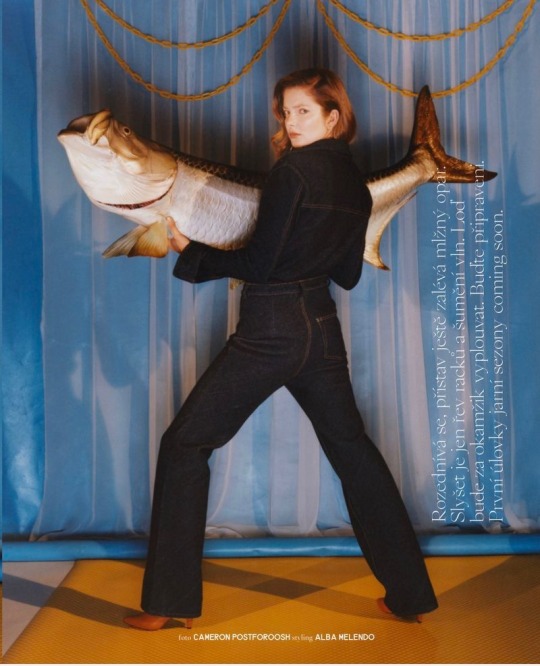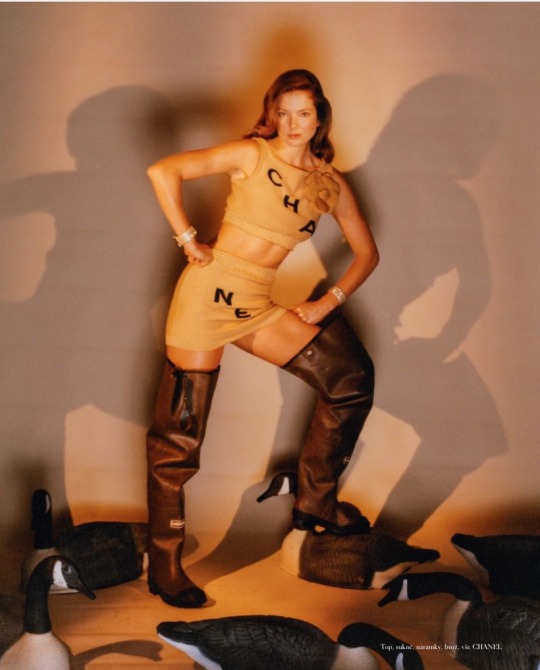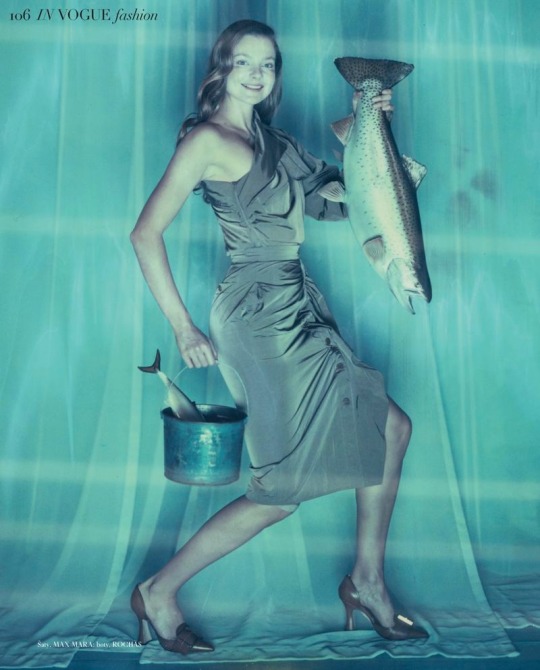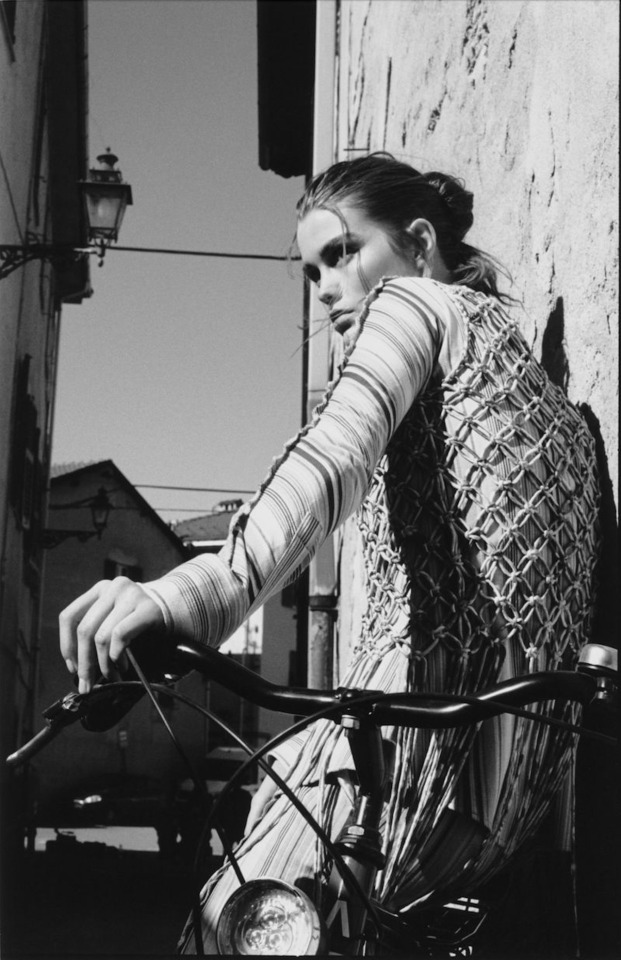#vogue czech
Explore tagged Tumblr posts
Text

37 notes
·
View notes
Photo



(via Eniko Mihalik Vogue Czech Fishing Fashion Editorial)
91 notes
·
View notes
Text

Luna Bijl by Arran & Jules for Vogue Czech, June 2023
21 notes
·
View notes
Text


Vogue Czech July ‘24 🕊️
ph. Samanta Katz
2 notes
·
View notes
Photo

Ireen, photographed by Eva Wang for Vogue Czechoslovakia March 2023
#Ireen#Eva Wang#fashion#fashion shoot#editorial#Vogue#Vogue Czechoslovakia#Vogue Czech#Vogue CS#model#style#fashion photography
28 notes
·
View notes
Text

Vogue Czechoslovakia March 2023
Aweng Chuol on the cover wearing Spring 2023 Couture Viktor & Rolf
#vogue#vogue cover#aweng chuol#viktor & rolf#couture#spring 2023#ss2023#art#vogue czechoslovakia#vogue cs#vogue czech#march 2023#tulle#gown#haute couture#model
1 note
·
View note
Text





























Paulina Porizkova
If you needed any more proof that older women can be sexy as hell then it’s right here. I guess it helps that she was always off the charts beautiful but still . . . 😛
Interestingly it’s only since she’s got into her 50s that she’s started taking her clothes off - and it’s not because she needs the work - she just seems to want to 😊😍
GR : 16
#paulina porizkova#vintage#1980s#czech#czech republic#supermodel#super model#fashion model#older model#elle magazine#vogue magazine
10 notes
·
View notes
Text



One day in Prague, Czech Republic.
We go on a new adventure in January and, of course, I still have unposted things from the trip we went on August.
#photography#sunseeker#aestehtic#photooftheday#happiness#happylife#love#travel#travelphotography#vogue magazine#vogue#fashion#prague#czech republic#vacation#vacaymode#Spotify
2 notes
·
View notes
Text










Ahoj, nevím kolik lidí používá tuto aplikaci v rámci cz/sk scénu, ale za pokus nic nedám a aspon i sem si uložím arty.
Mé jméno je Frances ale říkej mi Karle nebo Charlie a jsem student umělecké školy, zároveň si mile rád kreslím pro sebe nebo fotím.
Jsem v hodně fandomů, at už notoricky známé městečko záhad a další animáky, zpěváci nebo čeští youtubeři či fashion scéna.
Zde co vidíte je hlavně soubor Kovyho a jeho přítele Miroslava Romaniva :).
Tak snad si tahle stránka najde lidi.
Tento účet je hlavně pro cz/sk scénu :), do budoucna zde bude i další kontent.
Aj profil je tento: @firetieswashere
Tak se měj :)
0 notes
Text


Yilan Hua by Luka Booth for Vogue Czech December 2024
180 notes
·
View notes
Text

Reflection, Vogue Czech, 2018 - by Lucian Bor (1980), Swiss
109 notes
·
View notes
Text

Alessandra Ambrosio by The Morelli Brothers for Vogue Czech
20 notes
·
View notes
Text



Yilan Hua by Luka Booth for Vogue Czechoslovakia December 2024. https://www.instagram.com/vogueczechoslovakia/
Top Chinese model Yilan Hua takes a cover of the December 2024 issue of Vogue Czech [IG], styled in a Dior exclusive fashion story by Veronica Bergamini.
Rising photographer Luka Booth [IG] shares his own thoughts on Light and Darkness, a key signature of his sophisticated and elegant photography to date.
https://anneofcarversville.com/.../7yilan-hua-vogue...
13 notes
·
View notes
Text






📍 Villefranche-sur-Mer, France 🕊️ Vogue Czech July '24
ph. Carly Dame / Viktoryia Vaitusionak
#lindsey wixson#fashion#vogue#vogue czechoslovakia#jacquemus#miu miu#chanel#south of france#carly dame#nice#Villefranche-sur-Mer#editorial#portrait#35mm
30 notes
·
View notes
Text

Zoe Fang for Vogue Czech November 2023 photographed by John Clayton Lee
65 notes
·
View notes
Text
When you think of Jewish alcohol, Manischewitz (for better or worse) probably comes to mind. But slivovitz — a liquor with a forceful flavor and formidable strength — is arguably the Hebrew hooch.
Slivovitz, whose name is derived from the slavic word sliv for “damson plum,” is made by fermenting plums, distilling the mash to 80-100 proof alcohol, then aging the resulting liqueur for up to 10 years in oak barrels. Slivovitz is largely produced in Central and Eastern Europe, where different countries create their own variants. In the Czech Republic, for example, slivovitz (in Czech, slivovice) is considered the national drink of the region of Moravia and is served at room temperature in small shot glasses known as a panák. In Bulgaria, slivovitz holds special religious importance having been distilled for nearly seven centuries by members of Troyan Monastery. The monks’ special blend is made from Madzharkini plums, a variety that grows only in the Troyan region and is distinctive for its easily extracted pits.
Although grains are introduced during some forms of the slivovitz fermentation process, some distillers decided to forgo this step as a means of ensuring the liqueur was kosher. This gesture rendered slivovitz initially attractive to Jews during Passover, specifically Seder dinners that traditionally called for the consumption of up to four glasses of wine. Unfortunately, local wines were often made alongside other spirits under non-kosher conditions and thus were unacceptable. And because, as Dr. Glenn Dynner, professor of Jewish studies at Sarah Lawrence College, points out, imported kosher wine was often prohibitively expensive and of limited availability, Jews gravitated toward slivovitz on such celebratory occasions.
But its kashrut status alone is an insufficient reason why slivovitz is considered particularly, or even especially, Jewish. According to University of Pittsburgh professor and slivovitz historian, Dr. Martin Votruba, “Jews would acquire this local drink after moving into European kingdoms. They would simply pick it up as part of the culture.” It seems, however, their relationship with slivovitz became more purposeful during the 1800s in what is now Poland. Because they were considered relatively temperate compared to their countrymen, Jews were charged with operating drinking halls and taverns, and thus began to monopolize the liquor business, much of which revolved around slivovitz.
Another explanation as to why slivovitz holds a special place in the Jewish cultural imaginary is its strong anecdotal association with Jewish men of an older generation. In the 1990 film “Avalon,” which chronicles the trials and tribulations of a Polish Jewish immigrant family at the turn of the 20th century, brothers Sam and Gabriel reminisce about their father:
“He never drank water. And oh, boy, could he drink! What was that stuff called he always used to drink?’ ‘Slivovitz. Slivovitz. He used to call it, ‘Block and fall.’ You have one drink of that, you walk one block and you fall!”
Similarly, food writer Jordan Hoffman recalls his father describing how a swig of slivovitz (which they called ‘Shleeve-O-Wits’) by Hoffman’s grandfather signaled the breaking the Yom Kippur fast:
“… they’d peer out of the apartment window, waiting to spot him walking back from the synagogue. He’d take his sweet time, pull off his coat and hat, open a rarely used cabinet, blow the dust off an old bottle, take a sip of something, make a face, then announce that everyone could eat.”
As evinced by both accounts, slivovitz is not for the faint of heart and for some years, the caustic, bitter spirit fell out of favor. There are signs that slivovitz is slowly becoming back en vogue: restaurants, including New York’s renowned Kafana, serve slivovitz and a handful of distillers, such as Stone Barn Brandy Works, are producing their own new-fangled versions. And fans of the enormously popular series “Homeland” will attest that it’s the drink of choice for the character of Senator Andrew Lockhart.
Slivovitz’ nostalgic appeal combined with the introduction of new, more palatable varieties means it has some real so-old-school-it’s-cool potential. And who knows — the coming year may have us all slugging slivovitz slingers rather than espresso martinis.
youtube
19 notes
·
View notes